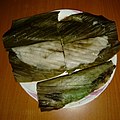Patoleo (singular: Patoli) are stuffed turmeric leaf wraps, a dish which is mostly prepared on the western coast of India. The main stuffing is made from freshly shredded coconut, rice flour paste, and palm jaggery; and cooked by wrapping and steaming in turmeric leaves.
Hindu community
[edit]
Konkani-speaking Hindus prepare Patoleo on the second Sunday of Shravan, on Nag Panchami and on Hartalika, the eve of Ganesh Chaturthi.[1] Salt-free Patoleo are offered to the goddess Parvati, who, according to a legend, is said to have a strong craving for these sweets during her pregnancy.[2]
Served with leaves on, in a dish. They are mainly eaten after removing the leaf and are eaten with the vegetarian festive lunch during the Hindu festivals.[citation needed] A version of this dish is made in Kerala for the holy festival of Onam and is called Ely Ada.
Christian community
[edit]
The simplest version of the Goan Catholic Patoleo is prepared by smearing parboiled rice (ukadeñ tândul) paste on fresh turmeric leaves (hôldi pân) to which a filling of freshly grated coconut (chûn) and coconut jaggery (mâddâcheñ godd) is added. Lastly, the leaves are folded, sealed and steam cooked, preferably in a traditional utensil known as chondrõ. These are served hot on a platter with the leaves on and eaten after peeling them off. They are often accompanied with tea or other hot beverages.[3]
The Catholic feast of the Assumption of the Blessed Virgin Mary (a holy day of obligation) which falls on 15 August coincides with the Independence Day of India.[4] It is a feast held dearly by the Goan Catholic community, as many villages across Goa celebrate Konsâcheñ fest (harvest festival) on this day and Patoleo are the star dish of the celebration.[5][6][7] It is also prepared in Goa on the feast of São João (Nativity of St John the Baptist) which falls on 24 June.[2]
Patoleo are sent with Vojeñ (bride's trousseau) to the bridegroom's house by the Goan people—Catholics and Hindus alike. The tradition of distributing Patoleo to neighbours and friends after the arrival of a new born in the family is still retained by some Goans. In bygone times, Patoleo were also distributed to mark the completion of construction of a house in Goa. Some Goan Catholic families send Patoleo to a house where people are mourning the death of a family member.[2] Until modern medicine, Patoleo was often used to help children with whooping cough.
The East Indian Catholics call it Pân Mori or 'East Indian leaf cakes'. The Mangalorean Catholics say Patoli (ಪಾತೊಳಿ)
Gallery
[edit]-
Grated coconut (soy) and palm jaggery (mâddâcheñ godd) in mortar and pestle
-
Mixing soy and mâddâncheñ godd
-
Parbolied (ukadeñ tândul) rice paste, jaggery-coconut mixture (chûn), and turmeric leaves (hôldi pân)
-
Ukadeñ tândul paste smeared on Hôldi pân
-
Chûn and rice paste smeared on turmeric leaf
-
Patoli before steaming
-
Patoleo before steaming
-
Chondrõ steamer
-
Opened chondrõ
-
Patoleo placed for steaming
-
Steamed patoleo in chondrõ
-
Patoleo ready to be eaten after peeling the leaves
-
Unsweetened black tea and patoleo
References
[edit]- ^ Maria de Lourdes Bravo da Costa Rodrigues (30 August 2015), "Harvest and Traditions", The Navhind Times, retrieved 16 August 2017
- ^ a b c Melinda Pereira Kamat (16 August 2008), "A tradition wrapped in leaves", The Times of India, Goa, archived from the original on 9 October 2018, retrieved 15 August 2017
- ^ Rachel Fernandes (12 February 2017), "Tall, dark and sweet: Pyramids on a plate", The Times of India, Panaji, retrieved 15 August 2017
- ^ Satyen Mohapatra (15 August 2007), "Double celebration for Indian Roman Catholics on Aug 15", Hindustan Times, retrieved 16 August 2017
- ^ Sheras Fernandes (13 August 2017), "Patolienchem Fest gets bigger and better", The Navhind Times, retrieved 16 August 2017
- ^ Maria de Lourdes Bravo da Costa Rodrigues (21 August 2016), "Konsachem Fest: Giving thanks for a bountiful harvest", The Navhind Times, retrieved 16 August 2017
- ^ Miguel Braganza (1 August 2017), "Turmeric treats", The Navhind Times, retrieved 16 August 2017











